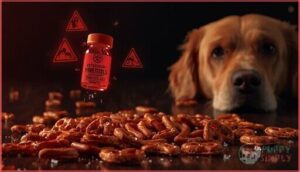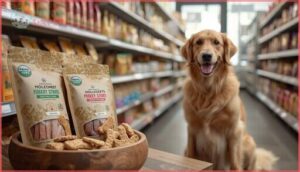This site is supported by our readers. We may earn a commission, at no cost to you, if you purchase through links.
Your dog’s pleading eyes follow your hand as you reach for a pretzel, and you wonder if sharing just one could hurt. Here’s my guide: plain pretzels won’t poison your pup, but that doesn’t mean they belong in the snack rotation.
The salt content in a single pretzel can push a small dog dangerously close to sodium toxicity levels. Most veterinary nutritionists see cases of salt poisoning from seemingly harmless treats like pretzels every month.
I’ll walk you through the specific risks, safe portion sizes for different dog breeds, and better alternatives that won’t leave you second-guessing your choices.
Table Of Contents
- Key Takeaways
- Can Dogs Eat Pretzels?
- Nutritional Value of Pretzels for Dogs
- Health Risks of Pretzels for Dogs
- Toxic Ingredients in Pretzels
- Pretzel Types: Which Are Most Harmful?
- Signs Your Dog Ate Too Many Pretzels
- Safe Pretzel Portions and Feeding Frequency
- How to Offer Pretzels Safely
- Healthier Snack Alternatives for Dogs
- When to Consult a Veterinarian
- Frequently Asked Questions (FAQs)
- Can dogs choke on pretzel rods or bites easily?
- How many pretzels can my dog safely eat daily?
- Are pretzels a common allergen for dogs to have?
- Do pretzels cause stomach pain in dogs immediately?
- Can I give my puppy pretzels as training treats?
- Can puppies eat pretzels safely at all?
- Do pretzels cause allergies in certain dogs?
- Are soft pretzels safer than hard pretzels?
- Can pretzels damage my dogs teeth over time?
- What ingredients make pretzels appealing to dogs?
- Conclusion
Key Takeaways
- Plain pretzels won’t poison your dog, but their high salt content (450-600mg per ounce) can trigger sodium toxicity, especially in small breeds, making them a poor snack choice despite being technically non-toxic.
- Flavored pretzels pose serious risks beyond salt—ingredients like xylitol, garlic powder, onion powder, and chocolate coating can cause life-threatening poisoning, red blood cell damage, or insulin crashes in dogs.
- If you do share a pretzel, limit it to one tiny piece every 1-2 weeks maximum for small dogs (or one small piece for large dogs), break it into fragments to prevent choking, and always provide fresh water immediately.
- Watch for warning signs of salt toxicity within hours of consumption—excessive thirst, vomiting, diarrhea, tremors, or seizures all require immediate veterinary care, as sodium poisoning can escalate quickly.
Can Dogs Eat Pretzels?
You’re probably wondering if it’s okay to toss your pup a plain pretzel when those puppy eyes start working overtime. The short answer is that plain pretzels won’t poison your dog, but they’re far from an ideal snack.
If you’re exploring other borderline snacks, check out whether dogs can safely eat pistachios before sharing your next handful.
Let’s break down what you need to know about safety, when an occasional pretzel might be fine, and the factors that should guide your decision.
Are Pretzels Safe for Dogs?
You might think pretzels are harmless because they aren’t on most toxic foods for dogs lists. But pretzel safety for dogs isn’t black and white.
Plain, unsalted pretzels won’t poison your pup, but they offer zero canine nutrition and come with real risks. High salt content can trigger health issues, especially if your dog has underlying conditions.
Following pet food guidelines means treating pretzels as an occasional indulgence, not a healthy treat option. Dogs are particularly sensitive to salt toxicity risks, which makes excessive pretzel consumption dangerous for their health.
Occasional Vs. Regular Feeding
Treating pretzels as an occasional snack versus a regular fixture in your dog’s feeding schedules makes all the difference. Here’s how to maintain dietary balance:
- Limit treat frequency to once every 1-2 weeks maximum
- Keep snack portions under 10% of daily calories
- Never replace meals with pretzels
- Rotate treats to avoid habit formation
- Prioritize nutrition planning with complete dog food
Regular feeding invites pretzel safety for dogs concerns you can avoid.
Key Factors to Consider
Before you share that crunchy snack, weigh a few critical factors. Your dog’s size and age affect how pretzel ingredients impact canine nutrition.
Check the salt content and scan for toxic ingredients in human food like xylitol or garlic powder. Pretzel allergies are rare but possible.
Following feeding guidelines and prioritizing dog safety means evaluating each pretzel’s risk against your pup’s specific needs and health status.
Nutritional Value of Pretzels for Dogs
You might think pretzels are just a harmless snack, but let’s look at what’s actually inside them. Most pretzels are made from basic ingredients like flour, water, yeast, and salt—nothing fancy.
Here’s what you need to know about how pretzels stack up against what your dog actually needs to stay healthy.
Main Ingredients in Pretzels
If you’ve ever wondered what makes a pretzel a pretzel, it starts with wheat flour—the backbone that gives it structure.
Yeast ferments the dough, creating those air pockets and aroma. Water activates everything, while salt (often sea salt) adds that classic flavor punch.
Before baking, an alkaline bath using baking soda or lye delivers the signature shine and deep color.
You can learn more in this discussion of the essential pretzel ingredients.
Nutritional Content Breakdown
A standard one-ounce pretzel packs around 100 to 120 calories, mostly from carbohydrates in refined flour. You’ll find minimal protein—just 2 to 3 grams—and less than 1 gram of fat.
Sodium levels hit 450 to 600 mg per serving, which is roughly 20 to 25 percent of a medium dog’s daily limit. Fiber content sits at a modest 1 to 2 grams, offering little digestive benefit.
Comparison to Dog Dietary Needs
Dogs thrive on balanced protein (18 to 25 percent), moderate fat (10 to 15 percent), and controlled sodium—roughly 100 mg per 100 calories.
Pretzels flip that formula: they’re carb-heavy, protein-poor, and salt-loaded, failing to meet canine dietary needs.
Healthy snacking for dogs means choosing nutrient-rich pet food options that support canine nutrition, not empty-calorie human food packed with toxic ingredients or dietary restrictions your pup can’t afford.
Health Risks of Pretzels for Dogs
Pretzels might seem harmless, but they can create real dog problems.
The main issues come down to what’s in them and how much your pup eats.
Here’s what you need to watch out for.
Salt Toxicity and Sodium Overload
High salt content in pretzels can trigger serious sodium poisoning in your dog. When dogs consume salt overload from human food, it causes hypernatremia—a dangerous electrolyte imbalance that pulls water from brain cells.
Pretzels’ high salt content can cause sodium poisoning in dogs, creating a dangerous electrolyte imbalance that pulls water from brain cells
You’ll notice dehydration risks like excessive thirst, vomiting, or tremors within hours. Severe salt toxicity may lead to seizures or even coma, requiring immediate veterinary care to restore normal sodium levels.
Obesity and Empty Calories
Pretzels load your dog with empty calories that sabotage weight management without meeting dietary needs. These crunchy snacks offer zero nutrient density, forcing your pup’s body to burn stored energy for essential functions while packing on pounds.
- Chronic calorie imbalance from frequent pretzel snacking leads directly to canine obesity
- Poor healthy snacking choices displace nutritious dog food that promotes canine nutrition
- Smart calorie balance and healthy alternatives for dogs protect long-term dog nutrition and health
Digestive Upset and GI Issues
Even a small handful of pretzels can throw your dog’s gastrointestinal health off balance, triggering vomiting or loose stools within hours. High sodium disrupts digestive enzymes and gut bacteria, sparking an inflammatory response in pups with stomach sensitivity.
| Symptom | What It Means |
|---|---|
| Gas and bloating | Carbs irritate digestive health |
| Vomiting or diarrhea | Body rejects toxic ingredients in human food |
| Restlessness | Abdominal pain signals food allergies in dogs |
Monitor for these warning signs of dog health trouble.
Toxic Ingredients in Pretzels
Some pretzels contain ingredients that go beyond just salt—they can be outright dangerous for your dog. Certain additives and flavorings, even in tiny amounts, can cause serious poisoning or organ damage.
Here’s what to watch for when checking pretzel labels.
Xylitol and Artificial Sweeteners
Your biggest worry with flavored pretzels? Xylitol toxicity. This artificial sweetener triggers a dangerous insulin spike in dogs, causing blood sugar to crash within 30 minutes.
Sugar substitutes like xylitol hide in many human foods, making pet safety tricky. Even tiny amounts are lethal. Always scan labels for toxic ingredients before sharing snacks—food toxicity from toxic substances sneaks up fast.
Onion and Garlic Powder
Beyond artificial sweeteners, garlic or onion powder poses serious seasoning dangers in flavored pretzels. Powdered forms are highly concentrated—delivering toxic ingredients at levels far worse than fresh versions.
Even trace amounts in flavor enhancers create concentration risks, damaging your dog’s red blood cells. These toxic foods cause cumulative harm over time. Dog safety requires checking every ingredient list, as food toxicity from common seasonings catches owners off guard.
Chocolate and Flavored Varieties
Chocolate-covered pretzels combine two toxic foods into one dangerous snack. Theobromine in cocoa content, especially dark chocolate types, attacks your dog’s heart and nervous system.
Even milk chocolate pretzels pack enough toxic additives to cause serious harm. Flavor profiles with sugar alternatives like xylitol multiply the danger. Skip these toxic treats entirely and reach for safe dog treats and snacks instead.
Pretzel Types: Which Are Most Harmful?
Not all pretzels are created equal in terms of your dog’s safety. Some varieties pack more risks than others, depending on ingredients, salt levels, and how they’re made.
Here’s what you need to know about different pretzel types and which ones pose the biggest dangers.
Plain Vs. Flavored Pretzels
Plain pretzels contain wheat flour, water, and minimal fat—making them safer than flavored varieties.
Flavored options often hide dangerous ingredients like garlic powder, onion seasoning, or xylitol in chocolate-coated versions. The baking process doesn’t reduce these toxins.
Salt content varies, but flavored types often pack more sodium. When you’re asking “can dogs eat pretzels,” plain beats flavored every time, though neither offers real nutrition.
Pretzel Chips and Sticks
Pretzel chips and sticks share the same pretzel ingredients—wheat flour, water, yeast, and salt treated with a lye wash during the baking process. Here’s what you need to know about each:
- Pretzel sticks are denser and hold more salt per snack portion
- Pretzel chips are thinner and crispier but still sodium-heavy
- Both offer that crunchy texture dogs love but challenge dog digestion equally
Neither format changes the fundamental risks when dogs eat pretzels.
Homemade Vs. Store-Bought Options
You can control fresh ingredients and nutrition when you follow homemade recipes, cutting sodium by 20 to 40 percent compared to store-bought options. That’s a big win if you’re wondering can dogs eat pretzels safely.
But even homemade dog treats aren’t healthy alternatives—pretzels safe for humans still lack the nutrients your pup needs.
Signs Your Dog Ate Too Many Pretzels
If your dog got into the pretzel bag, you need to watch for warning signs.
Salt overload can show up fast, sometimes within a few hours.
Here’s what to look for so you know when it’s time to call your vet.
Dehydration and Excessive Thirst
You’ll notice your dog drinking constantly if they’ve had too many pretzels. That’s a classic dehydration sign from salt toxicity. Watch for excessive thirst paired with frequent urination and dry gums.
Dark, concentrated urine signals poor hydration tips aren’t working. Can dogs eat pretzels safely? Not when electrolyte balance gets thrown off. Offer fresh water immediately and monitor their water intake closely over the next day.
Vomiting, Diarrhea, and Lethargy
GI distress hits fast when your dog’s had too many pretzels. You’ll see vomiting and diarrhea within 6 to 12 hours from stomach upset and electrolyte imbalance.
Canine lethargy often follows as their body fights the digestive issues. Dehydration risks climb quickly with these symptoms. If vomiting or diarrhea continues past 24 hours, toxic ingredients or severe salt overload may be at play—time for veterinary care.
Severe Symptoms and Emergencies
When you see tremors, seizures, or collapse, your dog’s facing salt toxicity or toxic ingestion from ingredients like xylitol or theobromine.
These severe allergies and neurological signs demand emergency response—call your vet or poison control immediately. Don’t wait if breathing becomes labored or consciousness fades.
Rapid veterinary care can mean the difference between recovery and tragedy.
Safe Pretzel Portions and Feeding Frequency
If you’re going to offer your dog a pretzel treat, portion size really matters. Even plain, unsalted pretzels should be an occasional treat, not a regular part of their diet.
Here’s my guide to keeping pretzel sharing safe based on your dog’s size, age, and how often you reach for the treat jar.
Recommended Serving Size
If you’re wondering what’s a safe serving, think bite-sized. Small dogs should get just one or two tiny pretzel bites—no more than a nibble.
Medium dogs can handle one mini pretzel segment, while large dogs shouldn’t exceed one small piece per day. Always break pretzels into manageable chunks to prevent choking and keep portions aligned with your dog’s daily calorie needs and dietary requirements.
How Often is Too Often?
Feeding pretzels more than once a week pushes your dog toward salt overload. Too frequent snacking raises canine health risks like dehydration and weight gain, especially in smaller breeds.
Regular pretzel treats displace nutrient-dense dog treats, creating dietary imbalance over time. Stick to rare occasions—about every one to two weeks—to keep salt intake low, snack limits respectful, and avoid overconsumption risks that compromise dog nutrition.
Age and Size Considerations
Your dog’s age and breed size reshape what “safe” means for any pretzel. Puppies under six months need puppy nutrition focused on growth stages, so even tiny salty bites disrupt development.
Senior care emphasizes gentler digestion and lower sodium—older dogs face greater dehydration risk. Size factors matter too: a Chihuahua’s threshold is far below a Labrador’s. Age considerations and canine nutrition always trump convenience.
How to Offer Pretzels Safely
If you’ve decided to give your dog a pretzel as an occasional treat, you’ll want to do it the right way. Here’s my guide to keeping things safe and stress-free.
Let’s look at three simple steps that reduce risks and keep your pup healthy.
Breaking Pretzels Into Small Pieces
If you’re offering plain pretzels, crushing them is key. Use a rolling pin or the back of a spoon to break pretzels into tiny fragments—about 1 to 3 millimeters for dogs.
Place them in a bag first to control the mess. Smaller pieces reduce choking hazards and make safe serving easier, especially since pretzels lack nutritional value anyway.
Monitoring for Choking Hazards
Even tiny pieces can pose choking hazards if your dog gulps them down. Watch for sudden coughing, gagging, or pawing at the mouth—signs of airway trouble.
If you see visible blockage, remove it carefully with a finger sweep, but only if it’s safe and clear. Keep emergency response steps handy and never leave your dog unsupervised during snack time—choking prevention starts with you staying present.
Ensuring Fresh Water Access
Salt from pretzels makes dogs thirsty fast. Keep a clean bowl of fresh water nearby—your pup needs hydration monitoring after even one or two bites.
Fresh water storage in BPA-free containers prevents contamination, and multiple access points around your home help. If your dog shows signs of dehydration, community support from your vet matters.
Never skip water when sharing salty snacks.
Healthier Snack Alternatives for Dogs
Look, pretzels aren’t the worst thing your dog could snag, but there are way better options out there.
I’ve compiled a list of nutritional value snacks that actually give your pup some nutritional value without the salt overload. Here’s my guide to treats that’ll make both you and your dog happy.
Dog-Friendly Fruits and Vegetables
Want to swap out those pretzels for something that actually promotes your pup’s pet nutrition? Fresh fruits like apple slices (no seeds) and blueberries make excellent healthy treats, while veggie snacks such as carrot sticks and green beans add fiber without many calories.
These choices align with canine diets, minimize health risks, and respect your dog’s dietary needs—just introduce them gradually to watch for food allergies.
Commercial Dog Treats
Your local pet store shelves hold better snack options than pretzels. Look for commercial dog treats with simple, recognizable ingredients like chicken or beef protein, whole grains, and natural preservatives like tocopherols.
Check the label for guaranteed analysis—crude protein and fat percentages—and avoid anything listing garlic, onion, or artificial sweeteners. These support dog nutrition and canine wellness without toxic ingredients.
Homemade Dog Snack Ideas
Baking your own treats gives you complete control over what goes into your dog’s snacks. Here are some simple, healthy dog treats I recommend instead of pretzels:
- Peanut Butter: Mix 1 cup whole wheat flour with 1/2 cup peanut butter and 1/4 cup water, then bake at 350°F for 15 minutes
- Oat Biscuits: Combine oat flour, rolled oats, and unsweetened applesauce for a fiber-rich option
- Sweet Potatoes: Mash sweet potatoes with oat flour and egg, bake until firm
- Banana Treats: Form mashed banana with oats into logs, slice, and bake twice for crunch
- Carrot Bites: Mix shredded cheese, mashed carrot, and whole wheat flour into bite-sized balls
These homemade dog snack ideas beat pretzels in nutrition and dog treat safety every time.
When to Consult a Veterinarian
Even if you’re careful about portions, things can go sideways when your dog sneaks a whole bag of pretzels.
Knowing when to call your vet can make the difference between a minor scare and a serious health crisis.
Here’s what to watch for and when professional help isn’t optional.
Warning Signs After Pretzel Consumption
If your dog sneaks a handful of pretzels, watch for signs of salt toxicity. Excessive thirst, vomiting, and diarrhea can appear within hours. Dehydration follows closely behind, often with lethargy or tremors signaling canine symptoms that need emergency care.
| Mild Toxic Reactions | Severe Pretzel Poisoning |
|---|---|
| Increased water drinking | Seizures or collapse |
| Restlessness or pacing | Inability to stand |
| Mild stomach upset | Bloody vomit or stool |
Contact your vet immediately if salt overload symptoms escalate beyond basic thirst.
Managing Accidental Overeating
Your pup’s pretzel binge calls for calm action, not panic. If overindulgence happens, offer fresh water immediately to counter dehydration from salt toxicity.
Here’s my quick recovery plan:
- Wait 10 to 15 minutes before offering more food to assess digestive relief needs
- Watch for vomiting or diarrhea within the first two hours
- Check labels for xylitol or harmful seasonings
- Encourage gentle movement with a short walk
- Return to healthy habits at the next regular mealtime
Professional Dietary Advice
Your veterinarian offers the best nutritional guidance suited to your dog’s age, weight, and health history. Vet consultation clarifies dietary restrictions for dogs and screens for toxic ingredients in treats.
Evidence-based veterinary advice for dogs includes health monitoring through regular check-ups and customized plans that address pet care and wellness concerns. Schedule follow-ups to track progress and adjust recommendations for dog safety and health risks.
Frequently Asked Questions (FAQs)
Can dogs choke on pretzel rods or bites easily?
Pretzel pieces present potential problems—hard shards can lodge in your dog’s throat, causing airway obstruction.
Rods are especially risky since their length creates choking hazards if swallowed whole without proper breaking.
How many pretzels can my dog safely eat daily?
Your pup shouldn’t have pretzels daily. For small dogs, one tiny pretzel once every week or two is the absolute maximum.
Larger dogs can tolerate two small pretzels weekly, following safe snack sizes and pretzel feeding guidelines.
Are pretzels a common allergen for dogs to have?
True food allergies to pretzels rarely strike dogs. Most reactions stem from wheat sensitivities or high salt causing digestive upset rather than classic allergy symptoms like itching or hives.
Do pretzels cause stomach pain in dogs immediately?
Most dogs won’t show immediate stomach pain from a single plain pretzel piece, but salt can irritate their stomach lining within hours, causing discomfort, nausea, or gastro issues depending on sensitivity and pretzel toxicity factors.
Can I give my puppy pretzels as training treats?
Skip the salty spiral—puppies need nutrient-rich training treats, not pretzels. High sodium and empty carbs don’t support growth. Use bite-sized, puppy-specific rewards to keep training safe and effective.
Can puppies eat pretzels safely at all?
You shouldn’t feed pretzels to puppies—their young digestive systems can’t handle the salt, and toxic ingredients for pets like xylitol pose serious canine nutrition risks during critical puppy nutrition growth stages.
Do pretzels cause allergies in certain dogs?
While pretzels seem harmless, wheat gluten triggers allergies in certain dogs.
Irish Setters and German Shepherds show higher sensitivities.
Watch for itchy skin, ear infections, and digestive upset after feeding pretzels to gluten-prone breeds.
Are soft pretzels safer than hard pretzels?
Neither type is truly safer—soft pretzels pack more calories and sodium per piece, while hard pretzels pose choking risks.
Both carry pretzel ingredients like excess salt that threaten dog snack safety and health risks.
Can pretzels damage my dogs teeth over time?
Yes, hard pretzels can wear down enamel and promote plaque buildup if your dog crunches them regularly. Crumbs lodge between teeth, leading to gum irritation and health issues over time.
What ingredients make pretzels appealing to dogs?
Dogs gravitate toward Salt Attraction and Crunchy Texture that release Aromatic Compounds during chewing.
The Fermentation Process creates mild sweetness, while modest Fat Content carries enticing scents.
Flavored types like Peanut Butter Pretzels or Chocolate Pretzels intensify appeal despite containing dangerous Theobromine or Xylitol.
Conclusion
Your pup’s next longing stare at your snack bag doesn’t have to end in worry. Now you know the answer to “can my dog eat pretzels” comes with important caveats: plain ones won’t poison them, but the salt load makes them a poor choice.
Stick to dog-safe treats like carrots or blueberries instead. When doubt creeps in about any human food, your vet’s number is the best resource you have. Your dog deserves better than salty regrets.


















